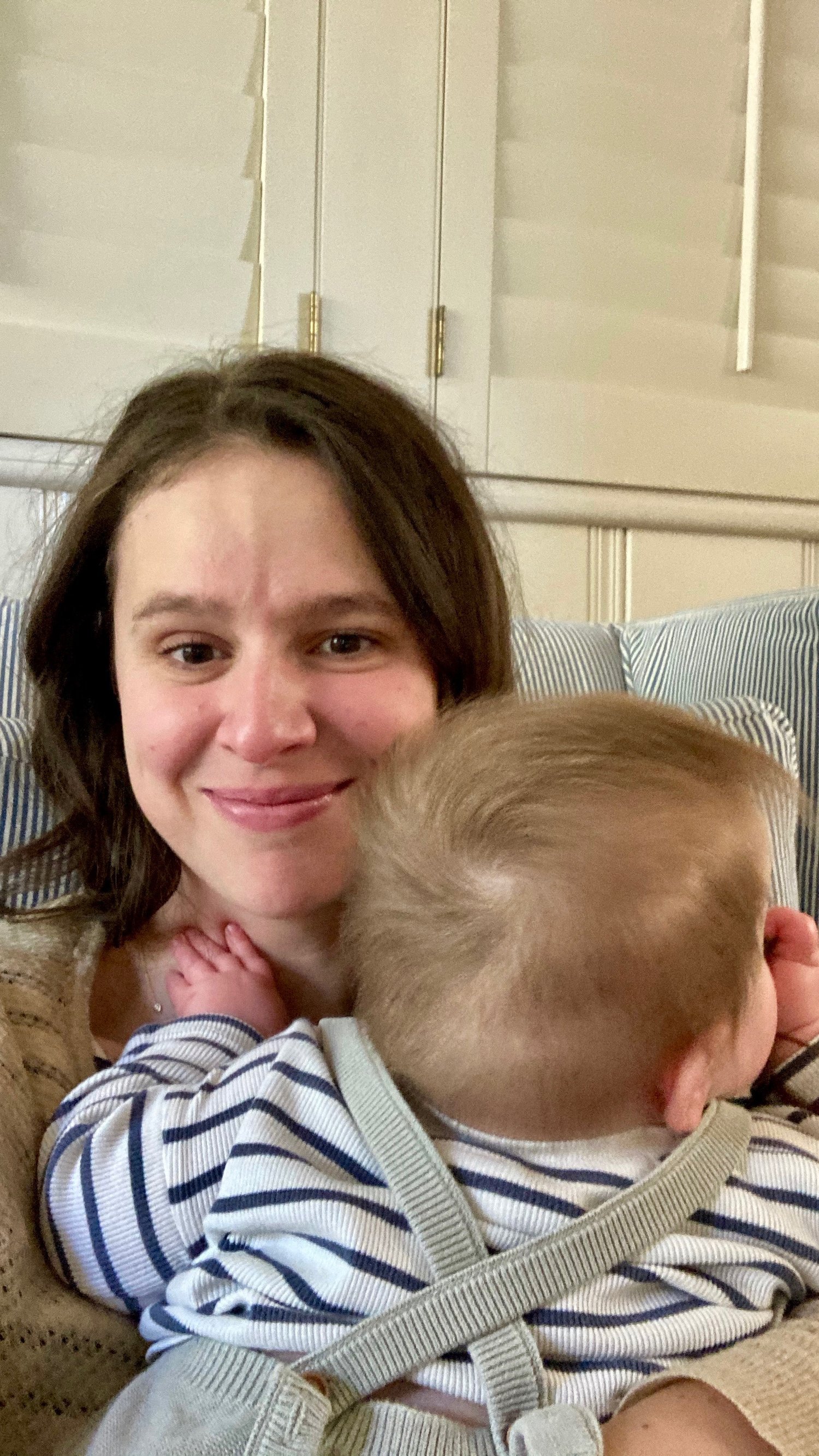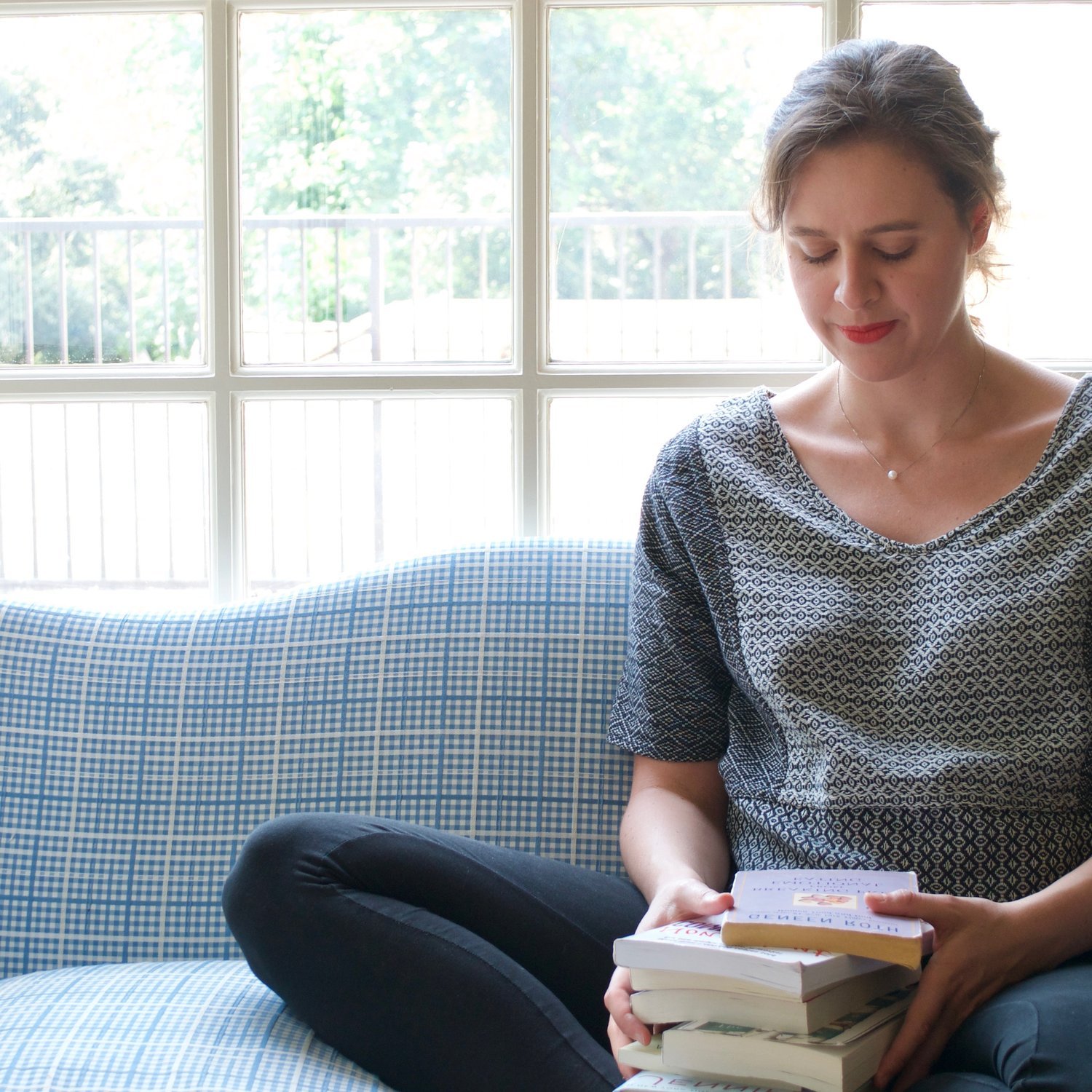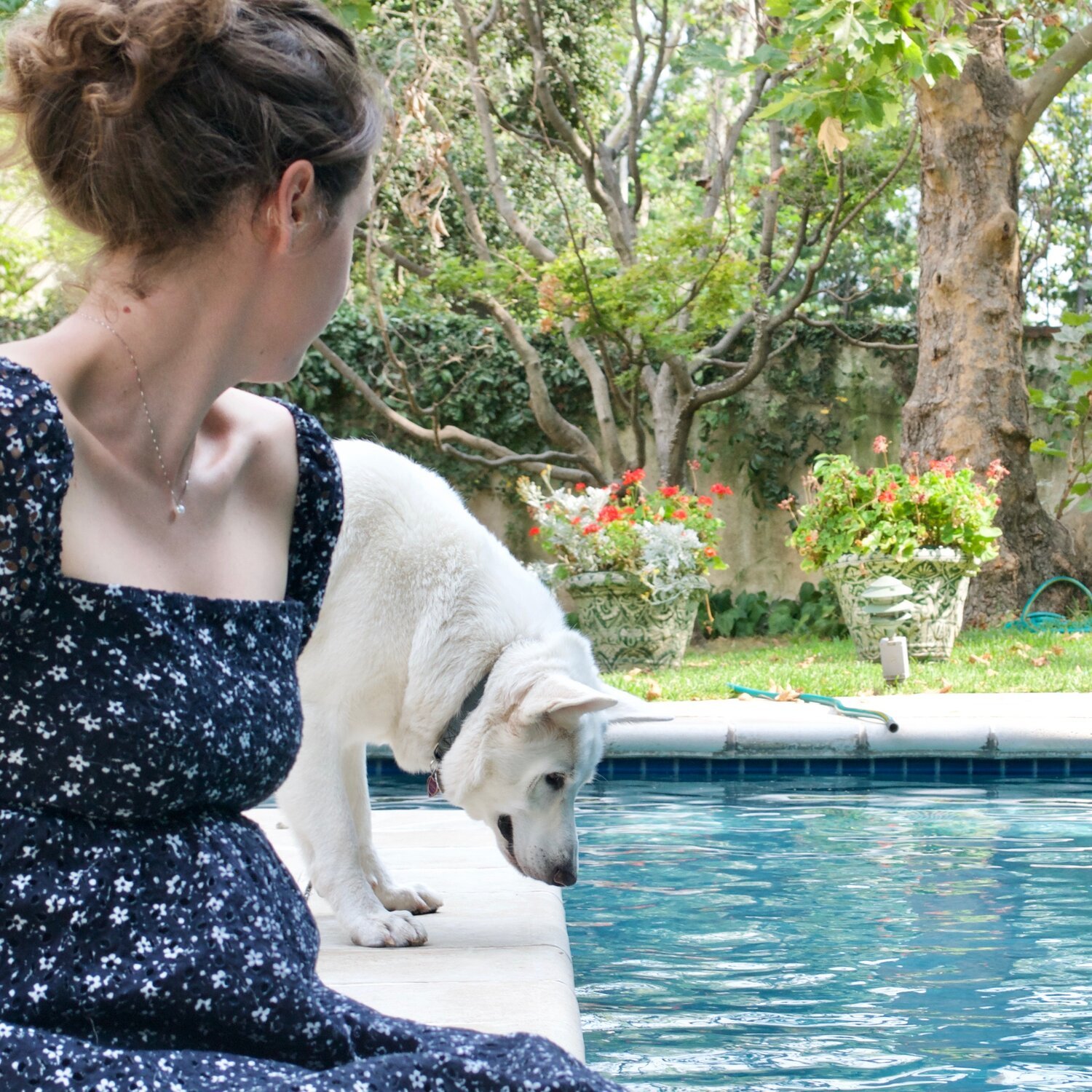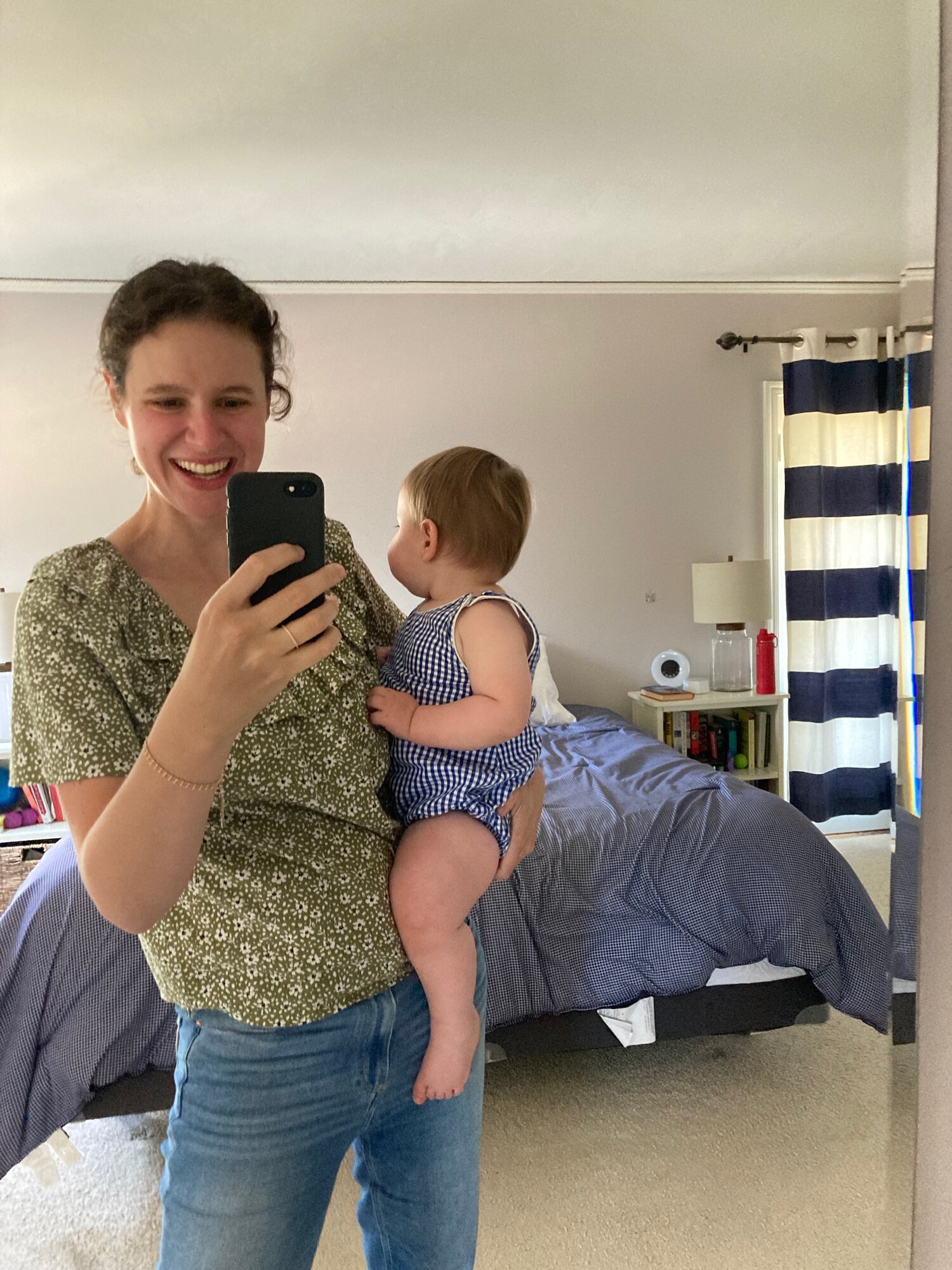Blog
On learning (+ being 100% Portuguese)
My husband is Portuguese. In fact, if he were here, he would like you to know that he is 100% Portuguese.
Several years ago, I set out to learn his native language. We got a beginner Portuguese textbook, and sat down for 45 minutes each week to work our way through.
Reader, It was rough.
Partly, Portuguese sounds were tough for my beginner mouth (In my opinion, European Portuguese sounds like a mix of a Slavic language — think Russian or Lithuanian — and saying the words “Oshkosh B’gosh” over and over.)
But mostly, it never seemed like I was really making progress.
Sure, we were slowly (so slowly!) inching our way through the textbook, but I often couldn’t even remember what we did in the week before. Was I making any progress?
I thought back to my days as a successful student:
There had been studying. There had been tests. There had been more than 45 minutes a week.
“I need to study,” I told my husband. “I’ll make flashcards, and vocab lists. I’ll quiz myself and review, so I can remember everything week to week.”
My husband listened to my plan. And then he calmly said it was a bad idea.
“If you keep showing up, you’re going to learn things.” He insisted. “Why don’t you just let yourself remember what you remember?”
I took his advice, mostly because I was busy and tired. It was only later that I realized he was suggesting an entirely new approach to learning for me.
…
When my husband corrected me on the pronunciation of the Portuguese letter “i” (i’s are always pronounced as “ee” in European Portuguese), I used to tense up and try to get the concept lodged in my memory.
But after deciding to just “remember what I remember,” I’d say: “I’m sure I’ll remember it eventually, if you keep reminding me.”
And then I did something incredible: I’d just “forget” about it. I just started assuming that eventually, that concept would get lodged in my memory.
And you know what? It freaking worked.
I started doing it with everything: vocabulary, conjugations, grammar.
Yes, my husband had to correct my pronunciation of the word “para” about a bajillion times (“para” can mean either “stop” or “for/to,” depending on the pronunciation of the first “a”). But also, I eventually totally got it — and now I do it without thinking.
I’m nowhere near fluent, but in the past several years, I’ve gotten to the point where my pronunciation is very passable, I can put together coherent sentences, and I can even eavesdrop a teensy bit on my husband’s phone conversations with his parents back in Portugal.
Our 45 minutes a week dropped to 35 minutes a week once my sons were born. And if there’s a been a lot of stress that week, sometimes 35 minutes doesn’t happen.
In 35 minutes or less a week… In allowing myself to remember what I remember…
… I have learned a lot.
…
I share this story, in the hopes of reminding you of two things:
Sometimes, the ways that we move through the world eventually stop serving us.
I was a successful student in high school and college (Magna Cum Laude at Princeton, thankyouverymuch) because of my rigorous approach to learning.
And yet, that same rigor made me associate learning with “tightness” and “stress.” Sometimes we have to completely take apart our old ways of doing things — ways which may have worked well for us in our past — in order to build something new. And that’s not only okay — it’s fantastic.Don’t underestimate what you can get done in 35 minutes a week.
Thirty-five minutes a week may seem, frankly, measly in the scale of a week. It may seem measly in the scale of a month. I’ve spent no time on this thing! How will I ever make progress?
But don’t underestimate the compounding effect over time.
…
Take care, my friends.
Or, as one says to a friend in Fazendas de Almeirim, Portugal (my husband’s hometown): Beijinhos.
Katie
p.s. It can it be tough to take apart + rebuild how you move through the world. You know what makes it 2x-100x easier? Having a life coach.
Here's what Jackie, one of my clients, said about working with me:
“I feel like the work I did in the past 6 months with Katie have catapulted me forward and I made progress in my own personal goals (weird eating habits, tech habits, personal art goals) that would have taken years if I had not worked with Katie."
Learn more about working with me here.
Sign up for my newsletter to get helpful + encouraging essays like this every Sunday morning. It’s free!
My advice for when other people don't like you (part 2)
Last week, I wrote about what to do when people don’t like you, or judge you.
I wanted to share one more insight on this topic, which always seems to land with my clients:
5% of people won’t like you — no matter what you do.
So if someone doesn’t like you, all it means is that you’ve found someone in that 5%.
When our brain freaks out because someone doesn’t like us, it is usually because we have the implicit belief: 100% of people should like me.
And yet, this is a thinking error.
It is impossible that 100% of people will like you. In fact, some percent of people (which I call 5%, but you can pick a different percentage if you like) will dislike you no matter what you do.
They won’t like your hair because they don’t like brunettes.
They won’t like your sense of humor because it reminds them of their annoying brother.
They won’t like you, because their ex-best-friend likes you and they hate their ex-best-friend.
If you, in an attempt to make them like you, changed your hair color or sense of humor… some other group of people wouldn’t like that.
Of course, it’s not rocket science that you can’t please all the people all the time. And yet, when we are upset that someone doesn’t like us, that’s typically what we are upset about.
So it can be useful to explicitly cultivate the thought:
5% of people won’t like me — no matter what I do. Now I have found someone in that 5%.
…
Several weeks ago, one of my clients was sharing, with clear pain, how her work colleague just didn’t seem to like her very much. It bothered her; she was trying every tool in her toolkit to turn the relationship around. And then I shared this concept with her.
Oh, I *was* assuming that if I did everything right, 100% of people would like me, she said.
But maybe this is just someone in that 5%.
Maybe I don’t have to change how she thinks of me…*at all.*
Relief.
Calm.
Even some giggles.
And you better believe she showed up better in that relationship — more confident, more interesting, and yes — more like-able — when she wasn’t trying to get her colleague to like her so much.
…
As always, I’m rooting for you in the week ahead. You’ve got this.
Katie
p.s. If you’d like more comfortable with people not liking you all the time, while also having more authentic, deeper romantic relationships and friendships (and not feeling like your chest is tight from low-level anxiety/exhaustion all the time), you should definitely hire me as your life coach.
To learn more about my work, click here.
Sign up for my newsletter to get helpful + encouraging essays like this every Sunday morning. It’s free!
My advice for when other people don't like you (part 1)
I’d like to make a radical suggestion:
When you fear that people are judging you — or even when you fear that they simply don’t like you — here’s what you should do:
Let them.
Let them think that you’re lazy.
Let them think you’re unintelligent.
Let them think you’re mean or inconsiderate.
Let them not like you.
Let them think all of those terrible things…. and do not try to change their minds.
And yes, this applies *even* to your boss/mom/best friend. It applies *especially* to them.
You might be surprised by what happens.
(What usually happens for me? Well, when I stop trying to manipulate them into thinking something positive about me… I feel radically more loving towards them. That, alone, loosens the relationship — and leads to many other positive results.)
As always, I’m rooting for you in the week ahead. You’ve got this.
Katie
p.s. I coach clients on all kinds of relationship issues — with their families, their partners, their friends, and their online dating profiles — and on everything from difficult conversations to people pleasing to loneliness to fostering deeper connections to setting effective boundaries (which often function differently than we assume). If you’d like to work with me, you can learn more here.
Sign up for my newsletter to get helpful + encouraging essays like this every Sunday morning. It’s free!
3 ideas on how to help you know what your most authentic self wants
Some time ago, I argued that if you truly know yourself, then it can be no big deal if people don’t agree with your decisions.
Reflecting on it, I realize that I wrote about “knowing yourself” as if it was the most straightforward thing in the world.
So, an important addendum:
“Knowing yourself” is not the most straightforward thing in the world.
In fact, it can be freaking hard.
For most people, it’s not that don’t know yourself at all. You probably do know that you love onion rings and reality TV, for example.
But if you struggle to make decisions, or to chart a path through life…you probably don’t know yourself as deeply as you might.
Here’s three tips that I’ve found helpful — for myself, and for my clients — in figuring out “how to know” yourself or what you want:
1. “Knowing” is more often done in the body, than the head.
Our smart brains can create a compelling argument for every side of the issue. That’s why pro-con lists can sometimes make us feel like we’re spinning out more, not less. By contrast: when we check in with our body sensations on a topic, we’re more likely to get a clearer, less variable answer. (More on that here.)
2. It’s often easier to feel our “no” than our “yes.”
For many people, it is easier to feel a “no” in your body than a “yes” in your body. My “no” is pretty consistent, and feels like a closed down and tight feeling in my heart + belly. (Wondering what your “no” feels like? Think of something as a clear “no” — an activity, a person, a job — and notice what sensations arise in your body.)
For most people, the experience of “yes” is more variable, and often more subtle, than a “no.” For me, sometimes a “yes” is just a mild feeling of spaciousness or openness. Sometimes it’s an almost imperceptible fluttering. If this idea of “checking in with your body” feels new to you, I suggest starting with finding a “no” feeling.
3. If your nervous system is highly agitated, it may be very hard to “know” anything.
Things that can agitate our nervous system include: being constantly busy, being exhausted, being chronically stimulated (this is why it can be hard to know what we want when we spend all of our free time on our phones).
If our nervous systems are agitated, it’s like an enormous amount of static, gumming up the phone line between you + yourself.
Some of us deal with this static by leaving our bodies — spending most of our lives as a floating head. In my experience as a coach, this is very common, especially with smart people. Whenever we do slow down or have quiet, we may feel extremely uncomfortable or agitated (it’s all of that static!) If this describes you, the first step is to calm your nervous system. Here’s one of my favorite daily practices to help with that.
…
For what it’s worth, when I say that it can be hard to know yourself, I speak from personal experience.
I spent years making pro-con lists about major life decisions, or doing what seemed like a “good idea” (which was usually shorthand for what seemed most impressive), because I didn’t actually know what I wanted. I was alternatively skeptical of people who seemed to know themselves + what they wanted on a core level…and deeply jealous.
And now, I’m one of them.
Which is to say: “knowing yourself” — knowing what you want in your bones and in your gut — it’s real.
And — maybe even more importantly — it’s achievable.
…
As always, I’m rooting for you in the week ahead. You’ve got this.
Katie
p.s. Knowing yourself is a skill — like tying your shoes. Some people get it more intuitively, and for others, it takes a bit of practice + maybe a bit of support.
Life coaching can be very, very helpful with this. I have one opening for a new client to start in May; if you'd like to snag that spot to work with me, you can learn more + reach out here.
Sign up for my newsletter to get helpful + encouraging essays like this every Sunday morning. It’s free!
Exhausted at work but can't take time off? Here's 6 ways to help
Many of my clients come to me with jobs that freaking exhaust them.
They tell me they absolutely have to quit their exhausting jobs, to become librarians or writers. Or live in airstreams by the sea. There’s no other way out.
I’m not against quitting one’s job, but today, I thought it might be helpful to share 6 ways that I help my clients have much more energy when their jobs are draining the life force out of them:
Get clear about your authentic priorities.
Many of us are unintentionally living as though “being a perfect employee” is our top life priority. But when we really think about it… it’s not.
Our priorities might be something more like: “I want to add a lot of value at work, while also having plenty of time to take care of myself and connect with my partner.”
The difference between showing up at work with the goal of “being a perfect employee” versus “I want to add a lot of value at work, while also having plenty of time to take care of myself and connect with my partner” can be night and day.Think new thoughts about your job.
You might be into this whole “I want to live in tune with my true values” idea.
But when you try to implement it, your brain might flip out. It might tell you things like: “You’ll get fired!” or “Your boss/colleagues will be so mad!” or “You can’t do a good job without working the way you’ve been working!”
These thoughts are very scary. They feel very true. So — you’ll keep working the way you’ve been working…which has been exhausting you.
And yet, far more often than we think, the thoughts that our brains are yelling are simply not true. In this example, it actually might be true that working in a way that would be in tune with your values would give you more energy, creativity, and resourcefulness, which might even (gasp!):Make you better at your job,
Delight your boss or colleagues,
Make you more likely to stay at your job (rather than quit to become a librarian or live in Portugal for a year). And yes… wait for it…
Make you more likely to eventually get promoted.
The way you think about your work situation deeply matters. If you believe that it’s irresponsible or careless to work less or work differently — you’ll simply never do it. This is something I often work with clients on: thinking new thoughts about the same situation.
(If you’d like to start thinking some new thoughts — here’s one way to get you started)You must work smarter, not harder.
I have never met a client who couldn’t put in less time and energy, with equal or superior results, by strategically shifting how they work. In other words: “working smarter.”
The tricky thing about working smarter (as with many of these points) is that it can be hard to see the opportunities in our own lives. This is where a coach who can point out opportunities you can’t see can be astonishingly useful.
But if you’d like to begin on your own, here’s one concept that I often share with my clients, as a way of kicking off the “work smarter” conversation.It might be time to build new skills.
Setting boundaries, making requests (for a new salary, for a promotion or a new project), having difficult conversations effectively with work colleagues, communicating well over email, processing and then letting go of anxiety when an interaction doesn’t go as you’d hoped — these are all things we can become more skillful at with time.
And “building skills” doesn’t have to be exhausting. I often find that my clients just need someone to point out a small new technique, tiny tweak, or opportunity they may have missed.Are you attending to what you need to attend to, outside of work?
Work is much less exhausting when we are well-rested, well-nourished, physically well, and emotionally supported in our out-of-work life. And yet: there can be a complex web of reasons why we might not, say, get meaningful rest, or have enough emotional support.
And here’s something I frequently find: my clients often think they know our out-of-work priorities, but as we dig deeper, it often turns out that their sense of priorities is actually no longer true for them. They think that they like how they spend their Saturdays, for example, but when we really dig in… it’s not working for them. Refreshing your priorities to help you get what you need right now often has astonishing dividends for work productivity and energy.
Coaching can help with that, too.Be thoughtful about when to leave, and when to stick it out.
Sometimes you can do all of the personal work in the world… but your job or your industry is just not suited to you. Coaching can help you tell the difference between the two, so you’re not stuck in anguish and mental drama about it.
…
If you take one thing from this essay, let it be this: There are many more opportunities to feel better at your job than you are currently seeing.
This is one (of many) areas in which life coaching can shine. Having a coach to talk through your specific situation in detail is worth its weight in gold (and in dollars and cents). If you’d like to work with me, you can find out more here.
But whether we work together or not, I hope this list gives you some ideas for where to start, if you ever start feeling exhausted by your job.
I’m rooting for you.
Katie
Sign up for my newsletter to get helpful + encouraging essays like this every Sunday morning. It’s free!
Being a beginner can suck. Here's one way to shift that mindset
Last week, I wrote about being a beginner. I made — in my opinion — a pretty compelling argument: if you’d like more vibrancy + sparkle in your life, being a beginner can help.
But there’s one more thing I want to say about this it’s-fabulous-to-be-a-beginner thing:
It can really suck to be a beginner.
I mean, sometimes it’s totally lovely + charming to be a beginner. I’m dancing the samba and I’m bad and I don’t care! But at other times, a beginner can bring up thoughts like:
I don’t know what I’m doing.
I’m terrible at this.
Everyone will *see* me being terrible at this. And judge me. And that judgement will cause something bad to happen.
These thoughts can be so scary that they stop us entirely from doing the thing that we want to do.
So today, I wanted to write to you the astonishingly effective tool I use to deal with painful thoughts like this. (And all kinds of other painful thoughts, actually).
The tool that I use is called Thought Work.*
I want to explain to you how it works, and then I’ll share a personal example of how I use it.
…
How it works:
There are two parts to Thought Work: (1) doing a thought download, and (2) analyzing your thoughts.
(1) Doing a Thought Download
Set a timer for 5 minutes, and write down every thought you have about a topic. (e.g., every thought you have about your attempts to learn French, or your new job). Thoughts can be judgements, fears, desires — anything. Just write down one per line on your paper, so it’s really easy to see each separate one.
(2) Analyze your thoughts.
Once you have all of your thoughts in a list, just take them one by one, and analyze them. You might ask yourself questions like:
In what ways is this thought true? In what ways is it not true?
Is there a thought that you think could be more true?
Could another thought be more useful to believe?
The point of this is to systematically examine your thinking. We often believe our thoughts as if we were reporting scientifically verifiable facts — when in reality, our thoughts are just beliefs. And someone else could just as easily… believe something completely different.
This practice may sound obvious. It may sound like something you already do, informally, in your head, or when you’re talking to your best friend.
But do not misunderstand me: doing it on paper, on a regular basis, is a radically different game.
…
An example of how I use Thought Work
In my free time, I’m writing a romance novel. I love relationships in general and romance novels, specifically — it’s something I’ve wanted (and tried, on and off) to do for years.
And yet, I’m a beginner at writing romance novels. The reason I’ve been “working” on a romance novel for so long — but not had a regular writing practice, till recently — is that my mind was full of fearful thinking on the topic.
I had thoughts like:
You’re too tired to write today. Everything you write will be terrible.
You’re not inspired. Don’t bother today.
You shouldn’t write at all. You’re a terrible writer of fiction.
Fine, you can write it. But you can’t show it to anyone or advertise it publicly to people who know you. Everyone would judge you for writing a romance novel. Also for how bad this novel is going to be.
So, of course, I didn’t write regularly!
It was only when I started doing Thought Work, each time before I sat down to write, that I was able to clearly see + dismantle each of these Garbage Thoughts. (I call thoughts “Garbage” when they are not true + harmful to me).
…
Here is, for example, my Thought Work From yesterday (I won’t show you the separate Thought Download; here is my analysis of each thought):
I’m too tired to write.
It literally doesn’t matter what you write, so it doesn’t matter if you’re tired. Just write absolute GARBAGE. That’s 100% FINE.
My writing will be bad.
To be honest, you are a terrible judge of writing. Your writing is pretty solid B- level, which is actually pretty awesome, considering what a beginner you are. You always complain that it’s bad, but it’s not true. So you have two options:
1. You can STOP complaining that it’s bad. Because it’s wrong. It’s just a dumb tape in your head. It’s actually pretty decent and will probably entertain at least one person. And once you’ve written a few novels, it’ll probably entertain a lot of people, because you’ll be an even better writer.
2. You can keep thinking you’re terrible, if you like it or find it motivating or something?
(No, actually I hate thinking this. It is painful and it’s discouraging and makes me never want to write again.)
But I can’t write TODAY.
Why not? Like, literally why not? You can write garbage. But it won’t be garbage; it never is. You CAN write something. Also — the goal of writing is to get to know your characters. So GET TO KNOW THEM!!
I need to change pants first.
No, you don’t.
Fine, whatever — do it. Change pants. Then set a timer and WRITE.
…
Having done this daily, it feels much easier to dismantle these thoughts. They go down easily, with less of a fight.
But I cannot overestimate how impactful this has been for me. Once I dismantle my thoughts, on paper, I feel so much freer to write.
And, of course, when we see someone else's thoughts it’s easy to see how ridiculous they are. You might be thinking to yourself: Well, of course, those are Garbage Thoughts, Katie! You definitely shouldn’t believe them. Just embrace being a beginner.
And yet, is there something you’ve been wanting to be a beginner in, but haven’t actually done yet?
I would bet you have your own Garbage Thinking on the topic.
Will you do a Thought Download and see?
(And to truly experience the life-changing effects of thought work, I recommend doing it daily for two weeks. When you systematically take apart your Garbage Thinking for fourteen consecutive days, you actually do — for real — start to believe different things.)
* Thought work, at its core, is simply the process of seeing and questioning one’s thoughts; we could trace it to established traditions from Buddhism to Cognitive Behavioral Therapy (CBT). The form I particularly love was developed by Brooke Castillo’s work at the Life Coach school, and I learned about it through one of my coaches, the wonderful Dielle Charon.
As always, you’ve got this.
Katie
Sign up for my newsletter to get helpful + encouraging essays like this every Sunday morning. It’s free!
On having a sparkle in your eye
“People who are over 40, who stop doing new things, tend to lose that sparkle in their eyes.”
One of my coaching mentors said this to me, several years ago. (And to be clear: I don’t think we need to be too precious about “40” — I’ve seen plenty of 30-year-olds with a dullness problem. And I’ve met plenty of 70-year-olds with serious sparkle.)
His overall argument was that when you’re young, you’re constantly forced to do new things. High school, college, and then your early twenties are a constant obstacle course of intellectual, social, physical, logistical, and emotional new things.
All of this newness can result in feelings of chaos or fear during our youth (they definitely did for me!).
But this newness also tends to lead to feelings of vibrancy or sparkle. When we do new things — when we encounter new people or new feelings or new problems — we become new.
On the flip side, one of the joys of getting older is that we know what we’re doing, most of the time. We become more skillful at work. We have committed relationships where we know what to expect. This can bring a sense of stability, calm, and power.
All good things.
And yet, if we stick too much to what we know how to do, we calcify a bit. Our lives get duller, less sparkly, or vibrant.
…
I wanted to share this with you today because frequently my clients come to me saying: My life just feels like... it’s dull. It lacks sparkle. Vibrancy.
Sparkle and vibrancy — like all problems I work on with my 1:1 coaching clients — are complex and multifaceted. But two questions I often ask are:
How often have you been a beginner lately?
How often have you done something new?
You might ask the same questions of yourself.
…
As always, I’m rooting for you. You’ve got this.
Katie
Sign up for my newsletter to get helpful + encouraging essays like this every Sunday morning. It’s free!
A PSA on recharging your battery
Please remember: Recharging your (emotional/mental/physical/spiritual) battery… may not feel good.
Sometimes, it may feel downright bad.
A few reasons why:
Your nervous system may agitated and fried.
You can avoid feeling uncomfortable body sensations when your life is still zooming along. After all, there’s always a new important thing to focus your brain on — you may be able to avoid feeling your body at all!
But once you slow down and try to rest, you may no longer be able to avoid the sensations that were always there, beneath the surface. They do get better over time — but the first brush with them tends to be the most intense.You may have unprocessed anxiety, insecurity, fear, sadness, or anger.
These unprocessed feelings could be about completely “understandable” topics (the loss of someone you love, for example), but could just as easily be about things you don’t deem “worthy” of such pain (a stupid comment by a coworker) — and yet, there they are.
These feelings may be easy to ignore when your life is moving fast, but they rush in when there is some space. And boom — you’re overflowing with resentment, or anger, or grief, or shame.Your brain may flip out.
When you slow down and try to rest, your brain may throw thoughts at you like: “you’re falling behind,” “you’ll never meet your goals,” and “other people don’t need so much rest like this.” Or even: “You’ve already been resting for an hour/day/week/month, you *should* feel better by now!”
It’s hard to feel calm and at peace with a chaotic brain.You may not know how to recharge.
A lot of lip service is paid nowadays to “self-care” — but I find that many people have not engaged with enough depth, iteration, and time with the complex work of truly recharging a profoundly empty battery.
Sure, sure, baths and walks and journaling can all help. But what is your very particular prescription, in this very particular season of your life?
I don’t say this to discourage you.
I say it because I find, too often, people are discouraged by the process of actually refilling their tank. They hoped it would feel like getting a massage in a white terrycloth robe. And sure, sometimes it feels like that. But it can also feel… quite challenging.
It can take a profound curiosity + courage to decide that this is a priority, and pursue it.
And above all: it can be done.
And: you can do it.
As always, I’m rooting for you. You’ve got this.
Katie
Sign up for my newsletter to get helpful + encouraging essays like this every Sunday morning. It’s free!
A 1-minute quiz to help lower your stress (especially during the holidays)
Whew. It’s been a year, huh?
When we’re tired (and at this point in the year, so many of us are tired), it’s easy to get a little overwhelmed by it all. Then we either do too much, do nothing, or get kind of reactive and weird.
So, instead, I propose that we do a teensy exercise together, to get a little more intentional.
Ready?
What’s your #1 priority, this week?
(My favorite types of priorities are for how I want to feel — e.g., calm, grounded, engaged, energized. But you can choose whatever you’d like.)What 1-3 things can you do this week, to help support this priority?
(Important: Make them things you’d actually like to do!)
…
And we’re done!
I don’t have the energy for a long self-reflection today. There are still Christmas decorations to clean up, after all. But want to see my answers?
1. What is your #1 priority, this week?
Feeling like my nervous system is calmer, and more grounded.
2. What 1-3 things will help support this priority?
Lowering my internet usage. I was so exhausted for some of this month, that I let myself do more internet vegging than I typically do (see: Level 1), but it’s getting to the point where it’s now making me feel more anxious, and my brain more foggy. Time to move to Level 2.
I want to focus my eating on calming, blood-sugar stabilizing foods, to help myself feel more grounded and slow.
Letting myself get a little bored. I’m not working much this week, and it can be tempting to fill the time with lots of fun things. But I find some slight boredom to be really energetically nourishing when I’m drained.
…
Feel free to send me yours, if you’d like. I’ll read each one.
Or start a text thread with friends where you each share yours!
Or just write it on a Post-it + put it next to your desk!
I’m wishing you a beautiful end of 2021. And, as always: I’m rooting for you. You’ve got this.
Katie
Sign up for my newsletter to get helpful + encouraging essays like this every Sunday morning. It’s free!
That time I was convinced I was a bad mom
One of my sons has some health issues, and recently, I was telling my coach about all the things I could (and maybe should?) be doing to make sure he gets the best possible care.
She listened carefully, and then she said to me:
Katie, I hear you that there are more things you could be doing for your son.
What percent of the time are you thinking about those things? Versus what percent of the time are you thinking about all the things you are *already* doing for him and his health?
And that’s when the pin could drop.
“Uh, it’s basically 98% on things I’m not doing,” I told her.
When we hung up the call, I promptly made a list of all of the things I’ve done to support him and his health.
You know what? There were a lot of things on that list.
You know what else? After I made that list, I felt a lot less anxious.
I even thought: Hey, I’m a pretty solid mom over here.
And: Hey, maybe my son *is* getting great care.
So here’s your invitation:
Worried that you’re not good at your job? Make a list of all of the ways in which you are incredible at your job.
Worried that you’re a “bad person”? Make a list of all of the ways in which you’re actually a good person.
Worried that you’re a bad mom? Make a list of all of the ways in which you’re an awesome mom.
The point here isn’t to tell a false narrative or to excuse inexcusable behavior. It’s simply that our brains tend to tell narratives that are heavily — and falsely — weighted towards the bad things.
It’s simply to say: a more balanced narrative would be 50-50, positive and negative.
And if it’s a particularly thorny issue for you, I dare you to make a list each day for a week or two. Giving your brain evidence of an idea that it finds hard to believe — over and over and over — does actually change how you think.
In other words: doing it every day feels cheesy…but it freaking works.
…
And a final, kinda-wild observation:
When I feel like I’m actually a pretty decent worker/friend/mom, I find I have even more energy to devote to that area of my life.
Somehow feeling better about myself is also better for other people, too.
I’m here for you. You’ve got this.
Katie
Sign up for my newsletter to get helpful + encouraging essays like this every Sunday morning. It’s free!
When all you feel is *no*
If you’re chronically exhausted, anxious, or “blah”, it’s likely that you’re missing useful information about what you need, want, and value.
I often help my 1:1 coaching clients uncover these very things. (And even the very self-aware among us may not fully know our needs or priorities! All humans have blind spots.)
But a peculiar thing often happens to my clients when they start their journeys:
They start to hear “no.”
No, I don’t want to do this job.
No, I don’t want to go to that party.
No, I don’t want to make dinner tonight.
No, I don’t even want to *think* about my next career step.
In fact, for quite some time, they may only hear “no.”
These “no’s” can feel very…annoying.
These “no’s” can start to get them down.
I want to figure out what I’m supposed to do next in my career! They tell me. Instead, the only clear answer I can get is that my deepest self…doesn’t want to do anything!
I wanted to share this because I’m not sure I’ve ever heard anyone share this very particular observation:
When we turn up the volume to our inner selves, often, the loudest thing we hear is “no,” at first.
I’m not sure I’ve ever heard anyone say it, so I’ll say it: This season of “no” is 100% normal.
I’ve lived my own season of “no’s.” And I’ve watched countless clients do the same. If you listen to the “no” for a while — and, importantly if you honor what they have to say — you will eventually start hearing “yes.”
“Yes” comes when your deepest self knows that it can trust you…
… To not burn yourself out.
… To not push too hard.
… To not override what you truly value for impressiveness. Or people-pleasing.
Don’t freak out if you’re in a season of “no.”
Just hold on.
Listen carefully.
Yeses are coming.
…
I wanted to share this, because I feel like I’ve been telling several of my clients recently. Perhaps it will resonate with you, too.
As always, I’m rooting for you. You’ve got this.
Katie
Sign up for my newsletter to get helpful + encouraging essays like this every Sunday morning. It’s free!
On knowing what doesn't apply to you
One of the most profound skills you can acquire is the capacity to know what doesn’t apply to you.
Maybe you read some great advice about making friends. But maybe that doesn’t apply to you — living in tune with your current priorities could require spending what free time you do have… alone.
Maybe you read some great advice about productivity or professional growth. But maybe that doesn't apply to you — maybe you need to worry less about your professional life, and more about your personal life, right now.
Maybe you read some great advice about saving money. But maybe that doesn’t apply to you — living in tune with your current priorities could require spending money.
The advice could be about health or cultivating a creative practice. It could be useful. Profound.
But it might not apply to you.
A thought exercise for today:
What ideas, hacks, or tips are you struggling to implement?
Is it possible that they don’t actually apply to you right now?
As always, I’m rooting for you. You’ve got this.
Katie
Sign up for my newsletter to get helpful + encouraging essays like this every Sunday morning. It’s free!
Something that often gets neglected (or: why your in-person friendships matter)
Many of my clients come to me feeling some combination of: stressed, tired, anxious, or unfulfilled.
The solution to their problems is multi-step and personalized (that’s why they hire me!) — and it does involve expected life coach-y things, like “what are your values?” and “what is your vision for your life?”
But I want to share something else that I often ask about — something that’s often not on my client’s radars.
Here it is: How are your in-person friendships?
Many of us are busy — between our jobs, our partners, our families, and of course, the effects of the pandemic — we may not see in-person friends that regularly.
Plus, many of us have meaningful relationships from earlier in our lives (high school, college, or an early job), but they don’t live nearby. While old friends are important, I strongly believe that there’s a powerful form of connection that is only possible through regular, in-person connections. (More on that here.)
And I will tell you: inviting my clients to cultivate more in-person connections is often an astonishingly effective quick win for them.
I can’t tell you the number of clients who come to our sessions looking sunnier, happier, less stressed — and they didn’t have to find a new job or the meaning of life. They just took a walk with a friend that they’d like to know better.
…
Are you thinking that it might be useful for you to have more connected in-person friendships? Here’s the top suggestion I give to my clients:
Ideally, the goal should be to set up a regularly-occurring hangout.
To be clear: “Regularly occurring” doesn’t have to mean every week! Maybe it means every other month — you get to decide.
But the goal would be to have a regularly-occurring day, time, and activity decided in advance + on both of your schedules. Maybe it’s a walk every other week, or a brunch once a month. I had one client who had a “nails friend” who she got regular manicures with.
That way, you don’t have to remember to reach out each time to initiate your next hangout, and then go back-and-forth to pick an activity and time.
The result of this typically means that you’ll see them so much more — and that regular connection is the stuff that meaningful relationships are built on.
Are you feeling a little nervous about this whole idea? Here’s two common fears I hear:
I don’t have true friends where I live.
That’s okay! Is there anyone who you’d like to know better? Maybe there’s someone you liked from a previous job or someone you met at an event who seemed nice. It’s okay if you don’t know them well yet, or they aren’t an official “friend.” All friendships have to start somewhere!
Typically, people are incredibly flattered to be asked to hang out — many of them are lacking in in-person friendships, too. And if they aren’t, someone else will be!
What if they don’t want to hang out with me?
This is an incredibly common fear. Initiating can be scary for many people! (Me included!) But here are two things to keep in mind:
First, how would you feel, if the person you were thinking about invited you to hang out. Wouldn’t you feel flattered? Delighted? Isn’t it possible that the other person might feel the same way?
Second, it’s also true that the other person might not want to hang out. That’s okay. It doesn’t mean anything about your worthiness as a friend — it simply means that they aren’t interested in pursuing friendship right now (which could be for all kinds of reasons that have nothing to do with you). There will definitely be other people who would be thrilled to be asked out by you.
…
I’ve been thinking + working a lot on my in-person friendships over the past few years. Sometimes I think to myself: Is this something I should have figured out by now?
But I don’t think that’s true.
I think that figuring out how to make friends in adulthood is an art.
What could be done with such ease in high school, college, or even your early 20’s (which is, for many people, an extension of college) — can feel much more tricky in full-fledged adulthood. People are busy, committed to partners and/or families, have demanding jobs. Plus, culturally, friendship can be put at the bottom of the list of priorities.
Which is to say: don’t beat yourself up if it takes some effort and intention to cultivate in-person friendships that nourish you as an adult.
But also: if you’re not feeling as amazing as you’d like to in your life — give some attention to your in-person friendships.
I know it feels like your problem is something else.
But you’d be shocked at how much of a difference a regular in-person hangout can make.
I’m in your corner. You’ve got this.
Katie
Sign up for my newsletter to get helpful + encouraging essays like this every Sunday morning. It’s free!
Two reminders about decision-making + what others will think
Two quick reminders about other people + decision-making:
1. Other people may not understand a decision you make, but that doesn’t mean it’s the wrong decision.
It’s simply the nature of life that sometimes you will make a decision that doesn’t make sense to them — or one that seems wrong or misguided.
No one — again, no one — will ever 100% “get you” like you get you. Even your soulmate. Even your best friend. Even your therapist.
(In other words: “This is your game.”)
2. Can you let them be wrong about you?
When other people doubt us, we often assume it means that we’re wrong.
But the Jedi-level Skill is the ability to do the opposite.
A Jedi has the capacity to say to herself: They’re simply mistaken.
And: I’m willing to let them be wrong about me.
…
I got this insight from Brooke Castillo, and it’s quite radical. If you can get comfortable with the idea that people will sometimes be wrong about you — and this can be okay, and you do not have to change their minds — you might just be ready to conquer the world.
(This is not, of course, to suggest that blind, unjustified confidence is the goal. It’s simply to say: the other person isn’t always right, either — and you get to decide what’s true.)
As always, I’m rooting for you. You’ve got this.
Katie
Sign up for my newsletter to get helpful + encouraging essays like this every Sunday morning. It’s free!
What to do instead of (only) worrying
I have a brain that tends to think about what can go wrong. Maybe you do, too.
Today, I wanted to share a strategy (which I first learned about here) that has made a huge difference for me.
Here it is:
When you notice yourself focused on what could go wrong, practice giving equal brain space to what could go right.
Here are some examples from my own life:
When I think: What if my mom dies soon and I miss her so much and can’t call her and chat about the most banal things and also important things?
I try to also think: Or, what if she lives for many years and we have so many lovely moments of connection together — and even after she’s gone, I have so many wonderful memories of her.
…
When I think: What if my husband dies and I am so lonely without him?
I try to also think: Or, what if he lives as long as I do, and we have such a meaningful, satisfying relationship. We cuddle lots, we talk about deep things, and I get to watch him grow and he watches me be the person I yearn to be.
…
Or, here’s another one for me, lately — we’re just about to do some renovations on our home.
When I think: What if our renovation goes terribly? It’s way more expensive than it seems, and it’s totally not worth it, and I just wasted all of this money, and I’ll really miss that money when it’s gone.
I try to also think: What if it’s one of the best things I’ve ever spent money on? What if it lets us enjoy our beautiful lives, the amazing California weather, and our experience as a family in our home, so much more deeply? What if I absolutely *love* it?
…
What I love about this strategy is that it doesn’t require us to only focus on the positive, or pretend that the world is only rainbows-and-rainbow-unicorns.
It simply says: the narrative you’re telling is overly — even unrealistically — negative. The negative thing isn’t the only thing that could happen; it’s just one, negative point on a whole spectrum of possibilities.
For me, training my brain to remember that things could also go right — truly, training my brain to tell a balanced narrative — has made an enormous difference.
As always, I’m rooting for you. You’ve got this.
Katie
Sign up for my newsletter to get helpful + encouraging essays like this every Sunday morning. It’s free!
Two simple questions to help you make decisions
Just a quickie this week.
I want to offer you two questions for when you are making just about any decision:
What are your reasons?
Do you like your reasons?
(That second one has not infrequently blown my mind. So often my default decisions are made for reasons I don't like — fear, people-pleasing, scarcity, avoidance of agitation, and more. These two questions give me the chance to be intentional about my reasons.)
I’m in your corner rooting for you.
Katie
Sign up for my newsletter to get helpful + encouraging essays like this every Sunday morning. It’s free!
Here's the (kinda wacky) way I tried to make new friends as an adult
Sometime this spring, I found myself craving 1-2 more deep and meaningful friendships. I wanted friends who lived nearby (here’s why), who were deep, self-aware, and thoughtful, and who were willing to show up consistently to build a relationship.
I wondered: What would be the most direct way to find these friends?
And then, in a flash of insight, it came to me: I should write a classified ad!
So — as one does — I wrote a 6-page Google Doc. I described what I was looking for, who I was, and who my ideal friend might be. It included lots of references to feelings, showing up authentically, and high quality baked goods.
Then I took out an ad in Claire Mazur and Erica Cerulo’s awesome newsletter, linking to that Google Doc.
Much to my surprise, it kinda… made a splash.
People were…fascinated by it. Excited by it. They wanted to do one themselves, and they wanted to know how my search was going!
Claire and Erica even invited me to come on their podcast to talk more about the process — what inspired me to do it, what I was looking for, and how it turned out so far.
If the idea of a friendship classified ad excites or intrigues you, here’s where you can take a listen.
As always, I’m rooting for you. You’ve got this.
Katie
Sign up for my newsletter to get helpful + encouraging essays like this every Sunday morning. It’s free!
Struggling to know what choice to make? Here's one place to start
The most direct step towards what we most want often doesn’t feel like a step towards what we most want.
In fact, it not-infrequently feels like a step in the opposite direction.
Here’s some examples of this, that I’ve seen with my 1:1 life coaching clients recently:
Want a new job?
You might think that the most direct next step would be to… Make lists! Have coffee chats over Zoom! Submit resumés! Go to interviews!
But your unhappiness at your current job might mean that you are exhausted and your nervous system is agitated.
Rather than exhausting yourself further by taking actions that are reactive, half-assed, or ultimately not right for you…rest might be the most direct next step. After you’ve rested, you’re going to do a much more effective job of identifying and pursuing your next professional step.
Your most direct next step might be to rest.
Want more money?
Often, we feel that when we want more money, we need to reduce our spending. This was how I thought about money, for a very long time — and has its merits, of course.
And yet, spending money on a coach might help you, say, increase your yearly earnings by 20%. Or 50%! Or triple your income when you sell that screenplay / book that role two years from now. You might earn back several times what you spent on your coach — far more than you could have saved by not hiring her.
Your most direct step might be to spend money.
Want to feel happy?
You might have felt sadness (or anxiety, or anger) bubbling up in you for some time. And those feelings? They feel terrible. You’d much rather feel happy, or positive.
And yet: those feelings might have something to teach you — or you might just need to fully process them in your body + your mind — so that you can move on to greater happiness.
Your most direct next step might be to feel more sad.
Want to feel calm?
You might have to sit in a bit of agitation that comes up when you try to lower your stimulation levels (which you will very likely have to do, in order to feel calmer.)
Your most direct next step might be to feel slightly more agitated.
…
To be clear: I’m not saying that any of these specific actions are always the right answer. They’re simply examples that I’ve seen in my clients’ journeys recently.
The key is that most of our paths won’t be a direct, non-step flight between here and our dreams. The most “direct” path often actually feels quite circuitous as we’re walking it.
So perhaps you will remember, if it ever feels like your next right step is in the totally wrong direction:
What if it was actually the most direct step, in the long term?
As always, I’m rooting for you. You’ve got this.
Katie
Sign up for my newsletter to get helpful + encouraging essays like this every Sunday morning. It’s free!
When compromise isn’t possible
Unfortunately, sometimes we find ourselves in situations where compromise isn’t 100% possible. In these situations, both of us can’t have what we want.
Either you’ll get what you want, or the other person will.
There’s no right answer in these situations. Sometimes you’ll choose to give the other person what they want. Sometimes you’ll choose to attend to your own wants or needs.
But please do remember that you get to choose.
You get to choose who gets what they want.
I’ll say it again: You are choosing.
Do you like your choice?
I’m rooting for you.
Katie
Sign up for my newsletter to get helpful + encouraging essays like this every Sunday morning. It’s free!
Two personal insights about refilling your tank + recovering from burnout
On Memorial Day, we discovered that one of my sons had some pretty serious health issues. Without sharing too many details, the past few months have included a hospital stay, specialists, medications, tests, and more.
In late July, we got the news that he is (I am crossing so many fingers as I write this) past the scariest part. I felt grateful, relieved, and… completely exhausted.
I gave myself a full day to just fall apart: not get anything done, do whatever I felt like (this mostly involved YouTube videos + online window shopping). But I noticed that even the next day, I wanted to be back in action, but… I was still completely exhausted.
It made me reflect on the other times when my emotional/mental/spiritual tank had felt empty, and I had two insights that I thought might be useful to you, as well:
1. There’s a relationship between how empty your tank is and how long it takes to refill, but it’s not linear.
If the relationship was linear, then if your tank was 2x as empty as usual, it would take 2x as long as refill.
But, in my experience, that’s not how it works. At minimum, if my tank is 2x as empty as usual, it takes 4x as long to refill. Or longer.
This is extremely important, because it’s a reminder that refilling your tank may take much longer than you expect.
(And, on a personal level, this is why I am, whenever possible, willing to spend money to reduce my tank emptying. When we had newborns, for example, we spent money to get help, and I think that made a truly astonishing difference to my year. Coming back from a tank that is, say, 3x as empty as usual is radically different than coming back from a tank that is 6x as empty as usual. Though, of course, many forms of tank-emptying are unavoidable, and most of us don’t have unlimited budgets.)
2. There are distinct stages to the process of refilling one’s tank.
I’ve come to realize that there are at least 3 phases in how I recover my energy. I actually call them “levels,” because it almost feels like a video game of “Katie Tank Refilling.”
In Level 1 of this process — when my tank is most empty — the only thing that sounds remotely appealing is not feeling so freaking tired. I feel completely uninterested in my Big Picture Goals, things like: reaching more people with these essays, doing home repairs, or getting better at French.
But another thing about Level 1 is that many of the intentional practices I write to you about (being intentional about technology! And exercising! Lying on the floor + sitting with uncomfortable feelings!) also seem completely unappealing. In fact, they seem exhausting.
Instead, I notice myself eating a little more indulgent food, being a little less interested in exercise, and — this is the most significant difference — vegging a lot more on screens. Interestingly, these things really do feel like they serve me, during this Level 1 period of an intensely empty tank.
And, then, there will be some point when I suddenly notice — and truly, it’s often kind of abrupt — oh wait, these things aren’t making me feel good anymore. The screen time, the more indulgent food, not moving as much — are now draining me, or making me feel more vague and foggy.
I’ve hit Level 2.
In Level 2, I resume my typical feel-good practices: being intentional about screens, eating, and movement. But the key thing about Level 2 is that my primary goal is still rest + recovery — I still feel pretty uninterested in Big Picture Goals.
And then, there will usually be another sudden moment (it might be days, or even weeks later, depending on how empty my tank was), when suddenly my Big Picture Goals actually feel… interesting.
Hello, Level 3.
…
As I write this essay in late July, I’ve just gotten past Level 1 (this weekend included a fair amount of YouTube, plus searching for toddler bookshelves and toddler sun hats online)… and I’m finding myself in Level 2. My goal for the week is to take amazing care of my clients, and otherwise, to rest + take excellent care of myself, till I get my energy back.
I’m willing to let Level 3 come when it comes.
(On a personal note: I love this insight because it makes me feel less anxious. I could get totally spun out and frustrated about my screen usage over the weekend, for example. But instead, I just said to myself: I’m in Level 1. I will know when I’ve hit Level 2 and it’s time to ramp this down. But I’m not there right now.)
…
I was talking with my friend Catherine Andrews last week, and she was like: Katie, this is a really great description of the process of recovery. Not everyone knows this.
So I wanted to share it with you. I hope it gives you encouragement, however your tank + process of recovery looks like today.
As always, I’m rooting for you. You’ve got this.
Katie
p.s. Life coaching can radically expedite the tank-refilling process. Like, it is insane what a difference it can make. If it’s of interest, you can learn more here.
Sign up for my newsletter to get helpful + encouraging essays like this every Sunday morning. It’s free!




















